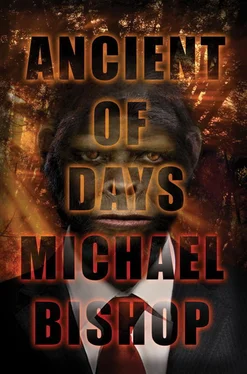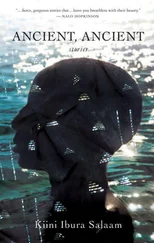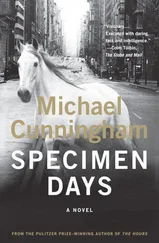Adam and Erzulie awakened. They had ceased to be loa —had become themselves again. Adam pulled Erzulie up, and the two groggy habilines turned to face us with a reluctance, or an apathy, that was palpable. The reality of this moment, no matter how strange, could not compete with the colorful intensity of their possession by the Haitian gods. Adam’s pupils were huge, as if he had imbibed light with which to illumine the visions of his trance. He stumbled toward RuthClaire before finding both his balance and his place in our small consensus world.
“Are you all right?” RuthClaire asked, catching him.
He was looking at Brian Nollinger. His pupils had contracted to the size of microdots. Something inside him, I thought, wanted to squeeze Nollinger utterly out of his sight.
“I was,” he said, his guttural voice scarcely audible. “I was.”
* * *
The five of us remained in Prix-des-Yeux for three days. We let Brian Nollinger stay because he had found us and would have little trouble finding us again. Too, he earnestly reiterated his promise not to divulge the location of the habiline village, if Adam would consent to his doing a respectful ethnographic study of the Rutherford Remnant. Adam consented, but his lack of enthusiasm suggested that he viewed Brian’s plea as a subtle form of blackmail. If he’d withheld consent, Nollinger could have avenged himself by returning to Rutherford’s Port and telling what he knew. Then Adam’s people would have had to move. Tearing down their houngfor and their huts would have posed no real problem, but on an island as small as Montaraz, finding an equally well-camouflaged site for a new village would have. So Adam let the blackmailer stay.
His decision irked me. Caroline’s offering the Montarazes unsolicited testimonials on Brian’s behalf didn’t sit well with me, either. What stake did she have in his staying with us? Why did she so value his talents—wholly untested talents—as an ethnographer? Why did she recall him with such fondness, when he’d deserted their earlier relationship without so much as a flippant ta-ta? I tried to find reasons. He was younger than I. His brief career in the Caribbean, begun out of something like Byronic desperation, gave him an irresistibly romantic air. Or, the least happy of all my conjectures, Caroline still loved him. She’d married me on the rebound, albeit a long one, and Brian’s reappearance in her life had come to her as a godsend.
Self-doubt. Paranoia. An absence of charity. I owned all these negative attributes. I kept thinking about what RuthClaire had jokingly said about killing Nollinger. The surreal tropical setting of Prix-des-Yeux had deprived me of all adult perspective. I was a teenager again, and the fact that I was living an oblique Lost Race fiction out of Bulwer-Lytton and H. Rider Haggard simply heightened my adolescent self-doubt. And the Lost Race whose culture Brian hoped to observe, whose art my new wife and I had come all the way from Atlanta to see, and whose survival the Montarazes wanted to insure? Well, on the afternoon of the day of our arrival, we met these unusual people one at a time over a period of about two hours.
At Adam’s bidding, Erzulie left Prix-des-Yeux, hiked into the dense shrubbery uphill from the huts, and returned in half an hour with one of her habiline compatriots. Then, after mutually awkward pantomimic greetings, Erzulie accompanied her charge back up the mountain to fetch the next. Each habiline came dressed in a togalike garment that varied not at all in style or color from person to person. With the appearance of the third habiline, I realized that Erzulie’s relatives were all wearing the same garment. An ochre stain on its hem gave the game away. Although the motto “one size fits all” was not strictly true (the smallest of the four members of the Rutherford Remnant had to gather the toga’s skirts and carry them across one arm), they pretended otherwise. In the absence of visitors, they obviously wore no clothes at all. Hence these serial debuts.
Erzulie’s head scarf and chemise were dictated solely by her current status as a go-between, a role that she must often have played with the superstitious islanders grubbing out their livings farther down the mountain. Older and more worldly-wise than most of her conspecifics, she could pass herself off as a deaf-mute mambo or vaudun priestess. The Haitians might suspect she was a habiline, but to regard her as a witch—rather than a deceitful weredemon or a quasi-human survivor of Sayyid Sa’īd’s slave market—conferred a degree of safety on their dealings with her. Cigouaves and habilines, after all, you should report to the Tontons Macoutes, and the fewer contacts with those guys the better. You could trust a four-foot-tall witch a lot further than you could a six-foot-tall cop with mirrorshades and a Springfield rifle.
In any event, Erzulie—both mambo and goddess—introduced us to her people.
The first of the four habilines was a grizzled old man with a broad flap of flesh for a nose and eyes the hue of cloudy gin. He was blind. Adam told us his name was Hector, but, as with all the names that Adam gave us, I felt sure he’d invented it as a convenience for the rest of us. Although blind, Hector oriented himself to every rock and blossom in the landscape as if he could see. Once, when a butterfly with iridescent moiré patterns and peacock eyes on its wings tumbled past us, Hector moved his head as if to follow its flight. RuthClaire conjectured that an acute sensitivity to air currents and minuscule temperature changes had allowed him to perform this trick.
The remaining three habilines came out in turn. They included a furtive, middle-aged male whose pot belly pooched out the fabric of the toga; a relatively young female with a deformed pelvic structure that gave her a gimpy walk without really slowing her down; and an adolescent male whose fierce mistrust of us revealed itself in his flashing eyes and the irrepressible tendency of his upper lip to pull away from his teeth. Adam called these three Toussaint, Dégrasse, and Alberoi. French names, every one. I reflected that before Peter Martin Rutherford deeded Montaraz to President Nissage Saget, most of the habilines had had English or Spanish names—if they’d had names at all. It hardly mattered, though. Among themselves, they most likely used primeval East African syllables, throaty names with no modern counterparts. Or maybe they had communicated by touch, gesture, facial expression, and eye movements. Because none of the Prix-des-Yeux habilines spoke, we had no way of knowing.
Toussaint, we learned, was young Alberoi’s uncle. Toussaint’s brother—the father of the edgy Alberoi—had belonged to the same gunrunning crew with which Adam had worked early in 1980. Adam had seen the murders of Alberoi’s father and his own brother by a Cuban thug (whom Caroline, by coincidence, had later interviewed in the Atlanta Penitentiary). As for Dégrasse, she’d broken her pelvis in a fall from a natural stope in the cave system above Prix-des-Yeux to a chamber far below it. She had been carrying an unborn child. The child died, and she had almost died. Friends managed to get her to the level on which she and her husband had made their home in the catacombs, and here she had eventually recovered. Destroyed along with her baby, however, was her ability to conceive. As the only surviving habiline woman of child-bearing age, she suffered from the knowledge (dim and unfocused, but ever-present) that her tenacious species was finally—after nearly three million self-abnegating years—doomed to pass away. Alberoi might well be the last of them to die, but Dégrasse had been their only viable hope for continuance.
Gone, that hope.
Читать дальше












